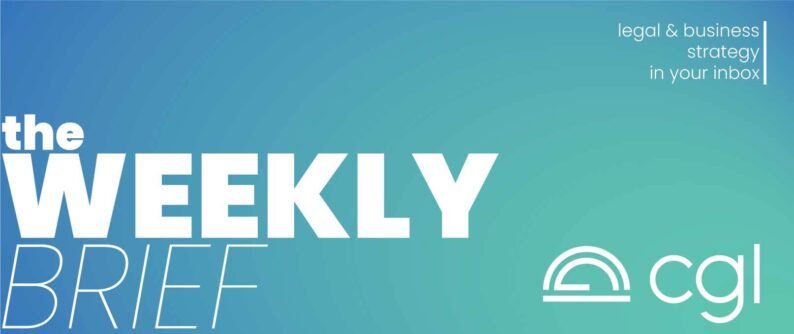‘Ethical Culture’ is having a moment. We’ve seen quite a bit of coverage about it over the past twelve months – especially following the announcement of the Patagonia Private Trust. But we’re yet to see much discussion about it through the legal lens. That’s why we’ve chosen it for this week’s newsletter.
What is an Ethical Culture?
There is no one definition of an ethical corporate culture. But, in essence, an ethical culture is founded on expectations and practices that encourage ethical decision-making and corporate conduct.
Given the increasing emphasis on ESG and rising consumer interest in ethical corporations (like B Corps), ethical culture is more routinely being considered as a route to reduce legal risk. It is also increasingly being linked to better financial outcomes.
Our research shows that an organization dedicated to sustainable human values will exhibit superior performance across operations and be significantly more successful at integrating ethics and compliance into its day-to-day operations. – LRN 2022 Ethics & Compliance Program
Ethical Culture and Legal Risk Management
Unethical corporate conduct invites a host of legal risks. Regulators like the CPPA, FTC, and FDA monitor for unethical conduct, and the fines run into the hundreds of millions of dollars.
Lawmakers also respond to poor corporate ethics. We’ve seen this in California recently in AB2777. This Bill opens a one-year window for individuals to bring an action against an entity for covering up a previous instance or allegations of sexual assault or other inappropriate conduct, communication, or activity of a sexual nature….” even if the claim would have been barred by a statute of limitations. The bill extends the window for lawsuits relating to unfair dismissal claims arising out of the sexual assault.
Practical Tips to Implement an Ethical Culture
1. Train Your Leaders
Observed misconduct is one of the leading factors for poor corporate ethics. The Wells Fargo cross-selling scandal is a high-profile example of legal risk that arises when corporate leaders send the wrong message to their teams. In case you need a refresher, Wells Fargo was fined $3 billion by the DOJ and SEC after its executives pressured its employees to aggressively cross-sell products to meet sales quotas. In response to the top-down pressures (and retaliation against employees who failed to meet sales targets), employees opened millions of accounts without authorization.
The key takeaway is that your leaders should know that they must model ethical values for other employees.
2. Publish Policies That Promote Open Communications
Simply saying that your ‘managers’ doors are open’ to anyone with a complaint is not enough. You need to have multiple policies in place to promote open communications about unethical and less-than-ethical conduct in your workplace. From there, you also need to ensure these policies are followed consistently to establish and maintain trust.
Policies that can help to promote open communications include:
- A formal complaints process, including details about where and how employees can submit a complaint or make a report. It can be a good idea to allow anonymous and/or confidential reporting to promote trust.
- Formal policies that prohibit retaliation against employees that lodge a complaint or participate in an investigation.
3. Document Your Expectations
You should document your commitment to ethical conduct in your internal and external facing documents.
Here is a (non-exhaustive) list of documents in which you might consider publishing your corporate ethics:
- Company core values;
- Mission statement (this is a best practice adopted by companies like Patagonia);
- Code of conduct;
- Employee handbook;
- Manager handbook;
- Regular ‘reminder’ emails distributed internally;
- Job descriptions and careers collateral;
- In a public-facing ‘commitment’ document on your website; and
- On your company’s social media.
OneTrust has published a helpful resource with a checklist for corporate Ethics and Compliance. You can read it here for more information.
If you need help integrating your corporate ethics into your workplace policies, reach out. Our employment attorneys would love to help.
Disclaimer
The materials available at this website are for informational purposes only and not for the purpose of providing legal advice. You should contact your attorney to obtain advice with respect to any particular issue or problem. Use of and access to this website or any of the e-mail links contained within the site do not create an attorney-client relationship between CGL and the user or browser. The opinions expressed at or through this site are the opinions of the individual author and may not reflect the opinions of the firm or any individual attorney.




